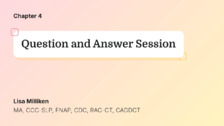Elevating Resilience at the Individual and
Organizational Levels (Recorded Webinar)
Presented by Lisa Milliken

12-Month Subscription
Unlimited access to:
- Thousands of CE Courses
- Patient Education
- Home Exercise Program
- And more
This course is a recording of a previously hosted live webinar event. Polling and question submission features are not available for this recording. Format and structure may differ from those of standard Medbridge courses.
Recent challenges, such as decreased reimbursement, inflation, compassion fatigue, longer work hours, and other stresses, have increasingly exposed organizations to conditions threatening their survival. Studies show how resilience at the individual and organizational levels can affect the success of organizations. This course will share evidence of effective organizational and individual strategies to promote greater strength and outcomes for everyone. Moving an organization toward resilience can improve worker morale, support leadership, and meet the fiscal requirements for running a successful organization with today’s “do more with less” mentality. Strategies will also be shared to help individuals remain happy and engaged with their jobs and personal lives. Resilience does not remove stress, but it helps us recover to experience personal and professional growth.
Learning Objectives
- Conclude the significance of resilience for making organizational and clinically sound decisions
- Determine effective strategies for organizational resilience that enhance occupational performance in healthcare teams
- Analyze leadership practices that encourage and support resilience within interprofessional teams
- Implement strategies for leaders to promote resilience at the individual level
Meet your instructor

Lisa Milliken
Lisa Milliken received her BA from Louisiana Tech University and her MA from the University of Memphis in audiology and speech-language pathology. She has since served adults and older adults as a clinician, manager, vice president, consultant, compliance manager, and education director, and is passionate about mentoring…
Chapters & learning objectives

1. Why Is Resilience So Important for Our Individual and Professional Outcomes?
This chapter will begin by defining the concept of resilience, including examples to further the participant’s understanding of the significance of resilience. The need for resilience will be supported by research, as well as references to different codes of ethics for sound decision-making. The Quintuple Aim will also be cited as further support for the need to be equipped with strength and stability for clinician well-being.

2. Resilience at the Organizational Level
This chapter will review the factors and benefits of a resilient organization, followed by an organizational model of resilience. Then, leadership strategies will be shared to support interprofessional team strength and resilience, including educational steps to develop a healthy workforce.

3. Strategies to Promote Resilience at the Individual Level
This chapter describes the effects of commonly reported stress factors on job engagement levels, burnout, and job satisfaction levels. Steps for building professional and personal resilience at the individual level will be reviewed. A brief self-assessment will then be shared for participants to complete and discuss. Next steps for increasing self-efficacy and personal strength to achieve results and rise above new challenges will be discussed.

4. Question and Answer Session
This chapter is a viewer-submitted question and answer session facilitated by Amber Richardson.